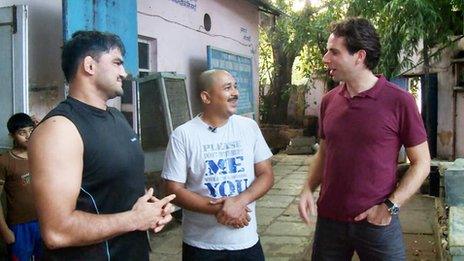Queen's Baton Relay: What is kushti wrestling?
- Published

Deepak Prasad (middle) chats with the BBC's Mark Beaumont (right) and wrestling champion Naveen Mor.
For around 3000 years, kushti wrestling has been a major part of India's sporting life.
Thousands of people regularly attend matches, where men and women wrestle in earth pits.
While professionals at organisations like the WWE entertain millions of people around the world with a mix of wrestling and acting, the life of a kushti wrestler is quite different to that of The Rock or John Cena.
"Kushti is a traditional form of wrestling," said Deepak Ansuia Prasad, a wrestling blogger, external and coach at the Guru Jasram Akhara in New Delhi. "We maintain a life of sacred people." That life is one of abstinence. Even talking about sex is 'taboo'.
"In wrestling, you have to remain pure," he added. "Sex, drugs, wine, tobacco, etc. If you are caught using these things, they will [put] you out of the akhara."
The akhara is a wrestling school where boys as young as seven join men in their 20s and 30s in a life dedicated to their sport. The wrestlers wake at 4am every day to intensively train for hours before eating. Another strenuous training session takes place in the early evening.
Activities like watching television and going to the cinema are permitted, while the wrestlers all help prepare meals together adhering to a strict diet of milk, almonds, ghee (a type of butter), eggs and chapattis.
The wrestlers fight, sleep, and eat together. Everything they do is under the supervision of their 'guru', or teacher.
'Strength and stamina'
Kushti matches are only won when one wrestler manages to pin his or her opponent by their shoulders to the ground for two seconds.
There are no rounds, so it is common for matches to last between 20 and 30 minutes. Deepak recalls the occasional bout that has lasted for over 90 minutes.
He said: "In India, every wrestler comes from kushti wrestling. When children are young, they join the akharas. When they get better, they also practice on mats.
"Wrestlers build their strength and stamina so the wrestlers fight long."
Such training has helped many Indian wrestlers go on to enjoy international success.
One of them is Sushil Kumar, a current Commonwealth champion and the first Indian to win back to back medals at consecutive Olympic Games in Beijing and London.
At the last Commonwealth Games in Delhi, Indian men and women won medals in 19 of the 21 freestyle and Greco-Roman categories - including ten golds.
While there will be no Greco-Roman wrestling in Glasgow, the Indians who make it to the city's SECC arena in July will be counting on their experiences from the countless hours in akharas to get them on the medals podium.